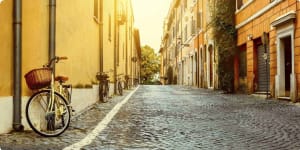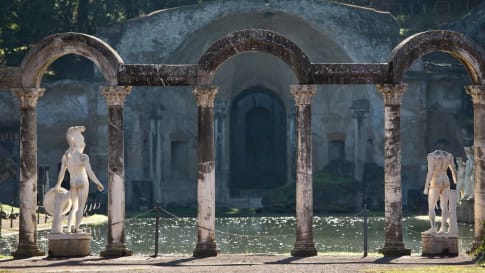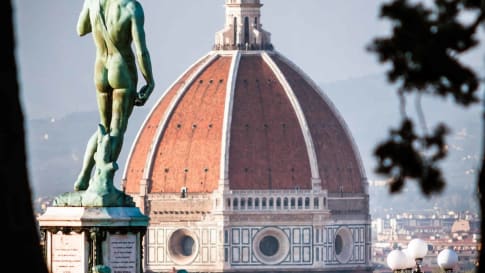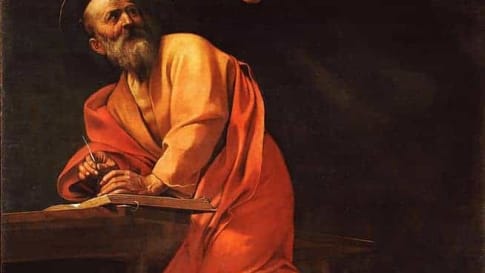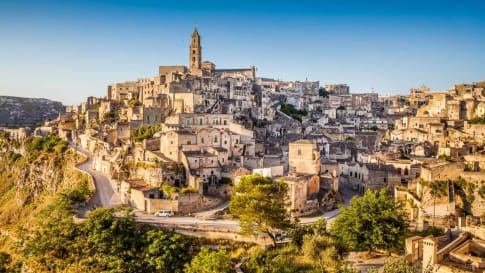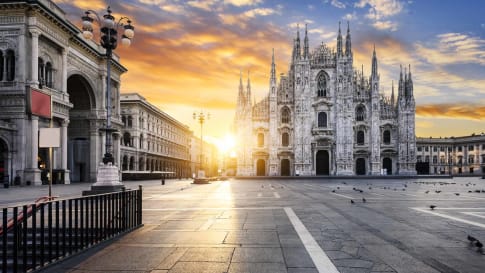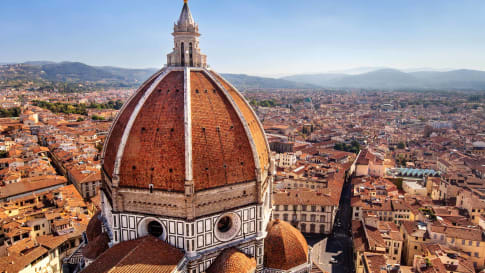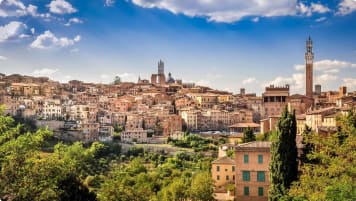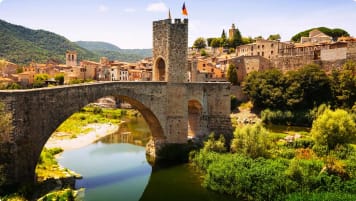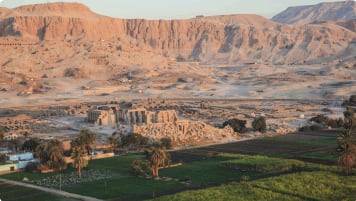Heritage, Culture and History of Italy | Small Group Tours for Seniors
Rome, the world’s first superpower, lasted for almost a thousand years. In this small group tour for senior couples and solo travellers we thread our way through the Rome of the Emperors, then through the Italy of the Renaissance, Michelangelo, the Medici, and the Borgia. In the south, we visit the cosmopolitan city of Naples as well as Pompeii and the island retreat of Capri.
From $15,565NZD
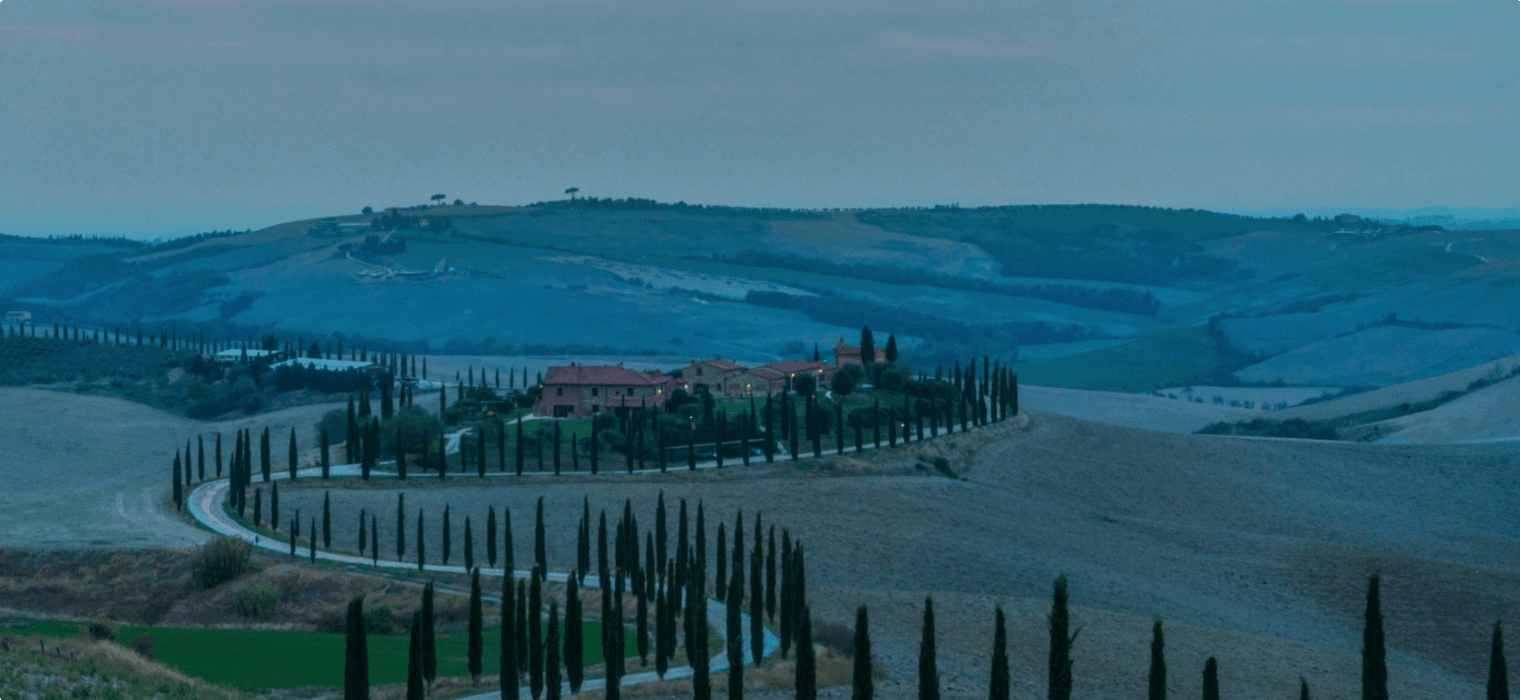
Highlights
- 1. Trace the hub of Europe's greatest empire through the fascinating Roman Forum, Colisseum, and Vatican Basilica.
- 2. See the treasures of Tuscany, including the Florence of Botticelli, Michelangelo, and Donatello.
- 3. Learn about the Franciscan religious order while visiting the Basilica of San Francesco in Assisi, Umbria.
- 4. Explore Campania, see the earliest Greek settlement of Cuma, and marvel at the Roman ruins of Pompeii.
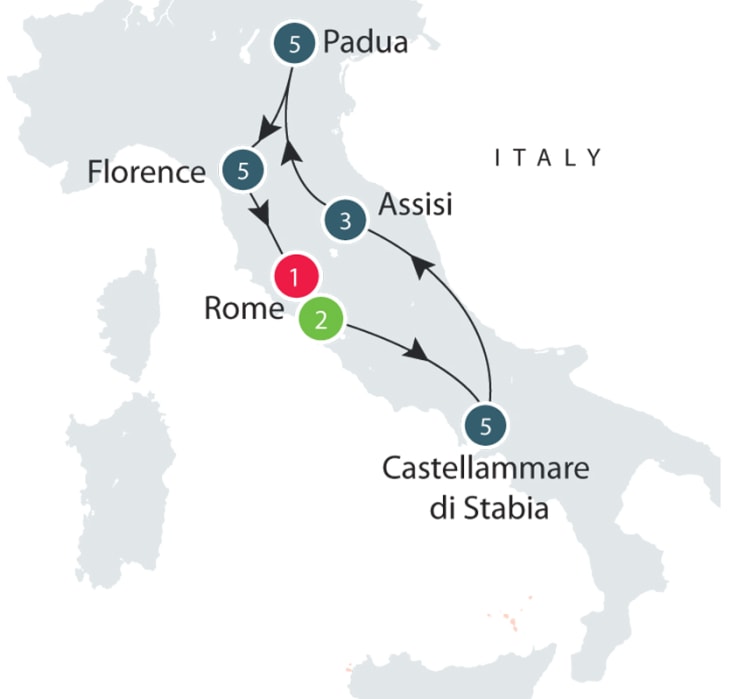
Departure Dates
| Departure Date | Price |
|---|---|
| 14 September 2025 Ends 05 October 2025 • 22 days $15,565 Twin $17,444 Single Available | Selected |
An Italy Tour for Seniors: explore the heritage, culture & history of Italy
Odyssey offers easy, convenient, and relaxed escorted small group tours across Western Europe and beyond. We explore Italy's’s fairy-tale natural beauty, its ancient Roman, and Imperial heritage, its World Heritage Sites, and world famous cities, all with some truly spectacular scenery along the way. This and more is all waiting to be explored on one of Odyssey’s small group tours of Italy, designed for the senior traveller, including solo and led by experienced, and enthusiastic like minded people.
This escorted small group tour exploring the heritage, culture, and history of Italy is a popular 22-day program for couples and solo travellers. Beginning in Rome, this trip to Italy, especially designed for mature-aged and senior travellers, is a fully escorted tour with a Program Leader local guides.
Itinerary
This small group tour of Italy examines the heritage, culture, history of this country. This tour includes expert local guides who share their knowledge of the culture and heritage of Italy. The program leader and the local guides are all passionate about the places they are leading the group. They are delighted to share their enthusiasm with you.
Heritage, culture, history of Italy, small group tour, takes you from the eternal city of Rome into the rolling terracotta countryside of Tuscany with its hilltop towns and on to the olive-clad slopes of the Paduan Hills. We stay in the green and craggy landscape of Umbria and spend 5 days at Castellammare di Stabbio on the Bay of Naples where we have the chance to view the breathtaking scenery of the UNESCO World Heritage Site, Amalfi Coast, with its whitewashed villages tumble into azure blue seas.
Our fully escorted small group tour of Italy features guided walks through the best of the Italian countryside. We also take in many of Italy’s major cities. These include viewing the Renaissance cities of Florence, Pisa, and Lucca. We also visit the Umbrian medieval cities of Perugia, Gubbio, and St Francis' Assisi. In the north of Italy, we visit the ancient university seats of Verona and Padua. We take in the stunningly beautiful Venice. Meanwhile, in the south, we visit the spectacularly cosmopolitan city of Naples, the Roman remains of Pompeii and the island retreat of Capri.
Articles and Other Italy tours for seniors by Odyssey Traveller
As a small group tour of Italy, it is perfect for the mature single traveller or couple seeking to learn about this collection of Italian cities and principalities while enjoying the country's many splendours.
Odyssey Traveller also offers a short, 11-day version of this tour.
We have a collection of guided tours for mature-aged and senior travellers seeking to see, feel and learn about this country. Click here for our other tours to Italy, and our tours to Europe.
We have a tour focused on Southern Italy and Sicily. Click here to see this tour package.
To prepare for the trip, check out our blog post listing 10 great books to read before travelling Italy! You can also see our other Italy-related articles here.
For more details about this tour from Odyssey Traveller or other small group tours of Italy offered, click the ‘Top 5’ or ‘Itinerary’ buttons above! If you’re keen to experience this tour, please call or send an email. Or, to book, simply fill in the form on the right hand side of this page.
Gallery
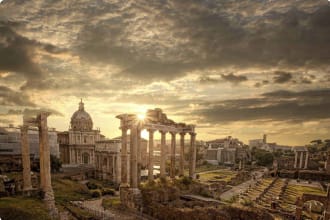
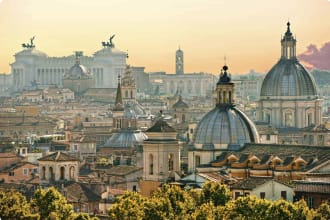
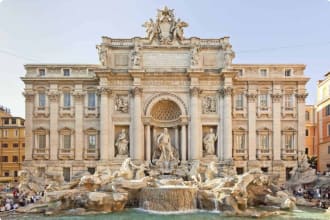
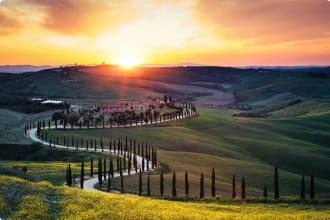
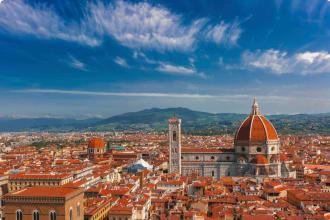
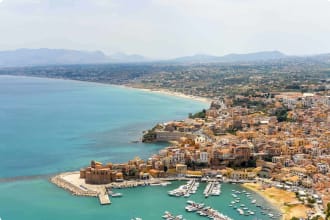
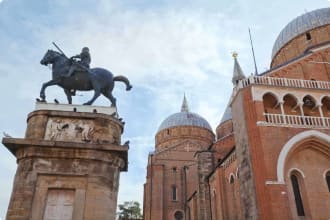
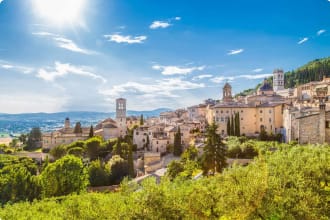
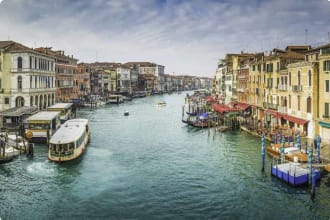
Itinerary
22 days
Day 1: Rome
Accommodation: 2 nights at Milani Hotel or similar.
Upon arrival in Rome we will come individually to the hotel. In the evening we will walk to a local restaurant for a briefing on the tour and dinner.
Founded by the Etruscans, Rome became the centre of Europe’s greatest empire and one of the world’s great religions. It still offers an astonishing array of outstanding sights, from the Roman Forum and Colosseum, to the great Vatican Basilica of St. Peter. The city is full of rich churches, monuments, and museums. Rome is a city in which a phenomenal concentration of history, legend, and icons co-exist with the hustle and bustle of its 4 million inhabitants.
Day 2: Rome
Accommodation: Milani Hotel or similar.
Today we will enjoy a morning city tour and learn more about the culture and history of the people of Italy. The afternoon is free to explore the city on our own.
Day 3: Castellamare di Stabia
Accommodation: 5 nights at Castellammare di Stabia or similar.
This morning we travel to Castellamare di Stabia near Naples, which is associated with the Etruscans and the Greeks. On the way we will pause in Cassino for a visit to the Abby. After we have lunch individually, we will continue on a guided tour of the preserved Roman city of Herculaneum, before arriving at our hotel in Castellamaare di Stabia in time for dinner.
Day 4: Castellamare di Stabia
Accommodation: Castellammare di Stabia or similar.
Today we will learn about Italy’s earliest Greek settlement, Cuma, where we will visit the Cave of Cumean Sybil. We will have time to explore the archaeological site before getting lunch individually and enjoying the afternoon at leisure.
Day 5: Castellamare di Stabia
Accommodation: Castellammare di Stabiaor similar.
This morning we will visit Pompeii with our local specialist guide and have a tour of the archaeological site. This region experienced a period of great prosperity under Roman leadership, as can be seen in the superb remains at Pompeii and Herculaneum. We discover the rich Roman heritage as we visit the excavated site of Pompeii, then we will transfer to Naples where we have lunch individually before having a guided tour of the main sights of the city. We visit the National Archaeological Museum and then enjoy some free time to explore the city on our own. We also visit the city of Naples and experience the awesomely stunning coastal scenery of the Amalfi Riviera where beautiful villages such as Positano and Amalfi cling to the dramatic rocks above the Gulf of Salerno.
We return to the hotel in the evening in time for dinner.
Day 6: Castellamare di Stabia
Accommodation: Castellammare di Stabiaor similar.
This morning we will travel to Paestrum and visit its archaeological site with our specialist guide. We will see the remains of superb Greek Temples. We will return to Castellamare di Stabia and enjoy the remainder of the day at leisure.
Day 7: Castellamare di Stabia
Accommodation: Castellammare di Stabia or similar.
This morning we drive the Amalfi Coast, pausing at some of the beautiful villages clinging to the rocks. We will meet our local guide and board the fast ferry from Sorrento across to Capri. We will learn about the Roman era as we visit Capri, from where Tiberius ruled the Empire.
We will visit the Blue Grotto before taking the funicular to the town of Capri, where we have a walking tour. We will transfer to Anacapri for another walking tour prior to taking the fast ferry back to the mainland. Lunch today is at our own arrangements on Capri and dinner is back at our accommodation.
Day 8: Assisi
Accommodation: 3 nights at Domus Pacis or similar.
Today we will leave the Bay of Naples for Assisi. En route we will visit the magnificently opulent Palazzo Reale at Caserta, a Versailles style palace built for Bourbon King Charles III, and pause at the Etruscan city of Orvieto, with its impressive cathedral. Lunch will be at our own arrangements and dinner will be at our hotel in Assisi.
Long dismissed as Tuscany’s “gentler sister,” Umbria has recently emerged from the shadow of its better-known western neighbour. Forming an expanse of gentle pastoral countryside and high mountain wilderness of oak woods and ice-clear streams, the picturesque region has been dubbed the “Green Heart of Italy.” It is a strikingly beautiful area with a profusion of fine historic hill-towns, such as Perugia, the region’s capital, Gubbio, Todi, and Spoletto. The region also boasts some fine Roman remains and some of Italy’s oldest churches. Assisi, the birthplace of St. Francis, contains the Basilica di San Francesco, frescoed in part by Giotto and Orvieto, magnificently situated on a volcanic crag.
Day 9: Assisi
Accommodation: Domus Pacis or similar.
Today we will meet our local guide for a morning walking tour of Assisi including a visit to the Basilica. In the afternoon we travel to Spoleto for lunch at our own arrangements and enjoy some time to explore this former Roman colony at leisure.
Day 10: Assisi
Accommodation: Domus Pacis or similar.
This morning we will visit Gubbio. This beautiful Umbrian town has much to offer. We visit the Church of St Umbaldo, raised above Mount Ingino, which offers stunning views of the town and surronding countryside. After lunch we will then transfer through to the university town of Perugia for lunch at our own arrangements, followed by a guided tour of the main sights of the city.
Day 11: Padua
Accommodation: 5 nights at Padova or similar.
Today we will leave Assisi and head north to Padua. En route to Veneto we will pause in Europe’s oldest and scenically located republic, San Marino. We will also see Ravenna, site of Dante’s tomb. Ravenna is renowned for its Byzantine mosaics. We will arrive in Padua in time for dinner at our hotel.
The Veneto is a region of great diversity, from the foothills of the Dolomites to the flat marshlands of the Venetian lagoon. It is a fertile land where many crops are raised on silt deposits. The Romans built their frontier posts here and many of these, such as Vicenza, Padua, and Verona survive to this day. Strategically placed at the hub of the empire’s road network, these cities prospered under Roman rule but suffered under the subsequent Germanic invasions. It was only with the rise of the Venetian Empire that the region’s fortunes revived. The medieval cities of the Veneto were located on important trade routes and the consequent wealth gained is reflected in Renaissance palaces and fine Palladian villas.
Day 12: Padua
Accommodation: Padova or similar.
This morning we will meet our local guide and visit the highlights of Padua, including its impressive Basilica and Scrovegni Chapel. Lunch is at our own arrangements and the afternoon is free to explore at leisure.
Day 13: Padua
Accommodation: Padova or similar.
Today we will explore Venice. We take the Vaporetto to transfer to Piazza San Marco where we meet our local guide for a walking tour, including visits to St. Mark’s Basilica and Doge’s Palace. The afternoon is at leisure to enjoy this fantastic city. We will come individually to Piazzale Romana to board the Vaporetto back to the mainland and transfer to Padua. Dinner will be at our hotel.
Day 14: Padua
Accommodation: Padova or similar.
Today we will travel to Vicenza and our local guide will lead us on a walking tour of this beautiful city, birthplace of Andrea Palladio. WE will explore the sights of the city and vist the impressive Teatro Olimpico. The afternoon is at leisure to enjoy the city on your own before we return to our hotel in Padua for dinner.
Day 15: Padua
Accommodation: Padova or similar.
Today we will travel to Vicenza and our local guide will lead us on a walking tour to explore the sights of the city including the Teatro Olimpico. The afternoon is at leisure to enjoy the city on our own before we return to our hotel in Padua.
Day 16: Florence
Accommodation: 5 nights at Istituto Suore Di S.Elisabetta or similar.
En route to Florence we will pause in the city of Verona with its fascinating Roman remains and “Romeo & Juliet” balcony, and enjoy a guided walking tour. We arrive in Florence in the evening for dinner at a local restaurant nearby our hotel.
Renowned for its art, history and evocative landscape, Tuscany is a region where the past and present merge in pleasant harmony. Hill-towns gaze across the countryside from on high, many circled by Etruscan walls and slender cypress trees, olive groves, or vineyards. Handsome palaces testify to the region’s wealth, while medieval town halls indicate a long-standing tradition of self-government.
Day 17: Florence
Accommodation: Istituto Suore Di S.Elisabetta or similar.
This morning we will explore the remarkable city of Florence with our local guide. We will visit the Duomo, including the Baptistery, and also the Accademia. Lunch will be at our own arrangements and in the afternoon we will explore the Uffizi gallery on our own (entrance included).
Day 18: Florence
Accommodation: Istituto Suore Di S.Elisabetta or similar.
This morning we will view the ancient Roman colony of Lucca, with its fine medieval streets. This afternoon, after lunch at our own arrangements, we will explore the city of Pisa with its infamous leaning tower. Our guided tour includes entrances to the Duomo, Baptistery, and Campo Santo. We will return to Florence in the evening for dinner at a local restaurant.
Day 19: Florence
Accommodation: Istituto Suore Di S.Elisabetta or similar.
Today we will have a guided walking tour of medieval Siena and view the main sights of the city. The remainder of the day will be at leisure in Florence.
Day 20: Florence
Accommodation: Istituto Suore Di S.Elisabetta or similar.
We spend today in the Tuscan countryside as we visit the hilltop village of San Gimigniano with its 13 medieval towers. After lunch at our own arrangements, we visit the Etruscan city of Volterra before returning to Florence.
Day 21: Rome
Accommodation: 1 night at Milani Hotel or similar.
En route to Rome we will visit Arezzo, whose 13th century church of San Francesco houses one of Italy’s greatest fresco cycles, and pause in the model Renaissance town of Pienza. Tonight we enjoy farewell dinner at a local restaurant.
Day 22: Rome
Our tour will conclude after breakfast.
Includes / Excludes
What’s included in our Tour
- Transport and field trips as indicated.
- Services of a Tour Leader.
- 21 nights accommodation.
- Applicable entry fees and services of local guides.
- Service charges and gratuities.
- Touring by comfortable and modern coach.
- Detailed tour information booklet.
- 21 breakfasts and 21 dinners.
What’s not included in our Tour
- Items of a personal nature such as telephone calls and laundry.
- Any international or domestic flights.
- Comprehensive travel insurance
- Airport transfers.
Participants must be able to carry their own luggage, climb and descend stairs, be in good health, mobile and able to participate in 3-5 hours of physical activity per day, the equivalent of walking / hiking up to 8 kilometers per day on uneven ground.
Book now
Make it a private tour
Easing your journey
Crossing international borders with restrictions
The list of requirements to travel internationally has changed and will continue to change for several years. Odyssey is here to assist you in managing your way through these requirements:
For more information see our Crossing international borders with restrictions page.
Book With Confidence
If less than 30 days before your tour starts you are unable to travel as a result of Government travel restrictions, Odyssey Traveller will assist you with a date change, provide you with a credit or process a refund for your booking less any non-recoverable costs.
See Terms and conditions for details.
Peace of Mind Travel
The safety of our travellers, tour leader, local guide and support staff has always been our top priority and with the new guidelines for public health and safety for keeping safe for destinations around the world, we’ve developed our plan to give you peace of mind when travelling with us.
See Peace of Mind Travel for details.
Reviews
The tour would be of particular interest to anyone with an interest in Roman and Italian Renaissance history. It would appeal particularly to those with an interest in sacred art and architecture. Participant May 2018
One of my most pleasurable holidays, and one I must repeat, as it was not long enough. We were most fortunate in having our marvellous tour leader.
B F
• It was a marvellous tour. I was privileged, as we all were, to see so many things of beauty, and so much history, in your very capable hands. Thank you for passing on some of your knowledge, and for your ready assistance. Thank you also for the photos and the list of guides; I'd been trying to remember the name of that rather good, but unusual fellow we met in Siena. No doubt because of his enthusiasm - and eccentricity - I remember Siena so well. (BH - Heritage Italy)
Participant May -15
• Thank you so much for being a wonderful leader for the Heritage Italy tour. It was so interesting and has left me with lots of things to think about and follow up in my reading. I found I had an old book giving the history of Greek science, i.e. the thinking of the Greeks in the early BC time. An interesting addition to our visit to Paestum and Cumae. The whole experience was marvellous and I have to thank you again for your kindness and consideration and the generous amount of time you gave to us all. I really appreciated that. (MB - Heritage Italy)
Participant May -15
Apart from just touching base and saying hi, I wanted to thank you for such a wonderful trip. Fourth time in Italy for me but the chance to get a little off the beaten track was really special... not to mention I got so much more insight into Italy than I had before. (KG Heritage Italy)
Participant Sep -15
Reading List Download PDF
The Italians
John Hooper
Sublime and maddening, fascinating yet baffling, Italy is a country of endless paradox and seemingly unanswerable riddles.
John Hooper's marvellously entertaining and perceptive new book is the ideal companion for anyone seeking to understand contemporary Italy and the unique character of the Italians. Looking at the facts that lie behind - and often belie - the stereotypes, his revealing book sheds new light on many aspects of Italian life: football and Freemasonry, sex, symbolism and the reason why Italian has twelve words for a coat hanger, yet none for a hangover.
The Pursuit of Italy: A History of a Land, its Regions and their Peoples
David Gilmour
Visiting a villa built by Lorenzo de Medici outside Pisa, David Gilmour fell into conversation about the unification of Italy with a distinguished former minister: '"You know, Davide," he said in a low conspiratorial voice, as if uttering a heresy, "Garibaldi did Italy a great disservice. If he had not invaded Sicily and Naples, we in the north would have the richest and most civilized state in Europe." After looking cautiously round the room he added in an even lower voice, "Of course to the south we would have a neighbour like Egypt."'
Was the elderly Italian right? Was the unification of Italy a mistake? The Pursuit of Italy traces the whole history of the Italian peninsula in a wonderfully readable style, full of well-chosen stories and observations from personal experience, and peopled by many of the great figures of the Italian past, from Cicero and Virgil to Dante and the Medici, from Cavour and Verdi to the controversial political figures of the twentieth century. The book gives a clear-eyed view of the Risorgimento, the pivotal event in modern Italian history, debunking the influential myths which have grown up around it.
Gilmour shows that the glory of Italy has always lain in its regions, with their distinctive art, civic cultures, identities and cuisine. The regions produced the medieval communes and the Renaissance, the Venetian Republic and the Grand Duchy of Tuscany, two of the most civilized states of European history. Their inhabitants identified themselves not as Italians, but as Tuscans and Venetians, Sicilians and Lombards, Neapolitans and Genoese. This is where the strength and culture of Italy still comes from, rather than from misconceived and mishandled concepts of nationalism and unity.
This wise and enormously engaging book explains the course of Italian history in a manner and with a coherence which no one with an interest in the country could fail to enjoy.
Florence: The Biography of a City
Christopher Hibbert
This book is as captivating as the city itself. Hibbert's gift is weaving political, social and art history into an elegantly readable and marvellously lively whole. The author's book on Florence will also be at once a history and a guide book and will be enhanced by splendid photographs and illustrations and line drawings which will describe all teh buildings and treasures of the city.
Rome: The Biography of a City
Christopher Hibbert
This beautifully written, informative study is a portrait, a history and a superb guide book, capturing fully the seductive beauty and the many layered past of the Eternal City. It covers 3,000 years of history from the city's quasi-mythical origins, through the Etruscan kings, the opulent glory of classical Rome, the decadence and decay of the Middle Ages and the beauty and corruption of the Renaissance, to its time at the heart of Mussolini's fascist Italy. Exploring the city's streets and buildings, peopled with popes, gladiators, emperors, noblemen and peasants, this volume details the turbulent and dramatic history of Rome in all its depravity and grandeur.
The Popes: A History
John Julius Norwich
John Julius Norwich examines the oldest continuing institution in the world, tracing the papal line down the centuries from St Peter (traditionally - but by no means historically - the first Pope) to the present. Of the 280-odd holders of the supreme office, some have unquestionably been saints; others have wallowed in unspeakable iniquity.
One was said to have been a woman, her sex being revealed only when she improvidently gave birth to a baby during a papal procession. Almost as shocking was Formosus whose murdered corpse was exhumed, clothed in pontifical vestments, propped up on a throne and subjected to trial.
From the glories of Byzantium to the decay of Rome, from the Albigensian Heresy to controversy within the Church today, The Popes is superbly written, witty and revealing.
The Borgias
Christopher Hibbert
The name Borgia is synonymous with the corruption, nepotism, and greed that were rife in Renaissance Italy.
The powerful, voracious Rodrigo Borgia, better known to history as Pope Alexander VI, was the central figure of the dynasty. Two of his seven papal offspring also rose to power and fame - Lucrezia Borgia, his daughter, whose husband was famously murdered by her brother, and that brother, Cesare, who served as the model for Niccolo Machiavelli's The Prince. Notorious for seizing power, wealth, land, and titles through bribery, marriage, and murder, the dynasty's dramatic rise from its Spanish roots to its occupation of the highest position in Renaissance society forms a gripping tale.
Erudite, witty, and always insightful, Hibbert removes the layers of myth around the Borgia family and creates a portrait alive with his superb sense of character and place.
SPQR: A History of Ancient Rome
Mary Beard
Ancient Rome matters.
Its history of empire, conquest, cruelty and excess is something against which we still judge ourselves. Its myths and stories - from Romulus and Remus to the Rape of Lucretia - still strike a chord with us. And its debates about citizenship, security and the rights of the individual still influence our own debates on civil liberty today.
SPQR is a new look at Roman history from one of the world's foremost classicists. It explores not only how Rome grew from an insignificant village in central Italy to a power that controlled territory from Spain to Syria, but also how the Romans thought about themselves and their achievements, and why they are still important to us. Covering 1,000 years of history, and casting fresh light on the basics of Roman culture from slavery to running water, as well as exploring democracy, migration, religious controversy, social mobility and exploitation in the larger context of the empire, this is a definitive history of ancient Rome.
SPQR is the Romans' own abbreviation for their state: Senatus Populusque Romanus, 'the Senate and People of Rome'.
The Roman Forum
David Watkin
There are few more historic and evocative places in the world. Caesar was cremated there. Charles V and Mussolini rode by it in triumph. There Napoleon celebrated his festival of liberty. In this radical reappraisal David Watkin teaches us to see the Forum with new eyes and helps us to rediscover its rich history. This is as stimulating to the armchair traveller as it is useful as a guide to the Forum itself.
'With verve, authority and no little humour, Watkin tells the detailed and complex story of this great but mutilated landmark ... it is an almost impossible task, superbly done' Peter Jones, BBC History Magazine
'In this sprightly volume ... the distinguished architectural historian David Watkin charts the shifting fortunes of the site ... he has an engagingly romantic feeling for the place... deploying a good deal of sharp wit, he reveals how the relatively recent obsession with recovering the Forum's classical past has led to much unhappy destruction and much less scarcely happy invention' Matthew Sturgis, Country Life
The Rise and Fall of the House of Medici
Christopher Hibbert
At its height Renaissance Florence was a centre of enormous wealth, power and influence. A republican city-state funded by trade and banking, its often bloody political scene was dominated by rich mercantile families, the most famous of which were the Medici. This enthralling book charts the family’s huge influence on the political, economic and cultural history of Florence. Beginning in the early 1430s with the rise of the dynasty under the near-legendary Cosimo de Medici, it moves through their golden era as patrons of some of the most remarkable artists and architects of the Renaissance, to the era of the Medici Popes and Grand Dukes, Florence’s slide into decay and bankruptcy, and the end, in 1737, of the Medici line.
The Black Prince of Florence: The Spectacular Life and Treacherous World of Alessandro de' Medici
Catherine Fletcher
'Nothing in sixteenth-century history is more astonishing than the career of Alessandro de' Medici' Hilary Mantel
In The Black Prince of Florence, a dramatic tale of assassination, spies and betrayal, the first retelling of Alessandro's life in two-hundred years opens a window onto the opulent, cut-throat world of Renaissance Italy.
‘Astonishing … gripping and original … a compelling portrait’ Financial Times
‘Packed with intrigue … Fletcher describes with cool menace the plotting and politicking that dominated Alessandro’s rule … brought splendidly to life in this excellent book’ Sunday Times
‘Engrossing … bursts with stabbings, poisonings, duels, eye-gougings, arquebus shootouts and people being run through with swords. Fletcher’s approach is scholarly yet dramatic, immersed in Renaissance glamour … a tremendous step forward in our knowledge of this intriguing man’ Spectator
‘Scintillating. This is everything a historical biography should be’ Ian Mortimer, author of The Time Traveller's Guide to Medieval England
The year is 1531. After years of brutal war and political intrigue, the bastard son of a Medici Duke and a ‘half-negro’ maidservant rides into Florence. Within a year, he rules the city as its Prince. Backed by the Pope and his future father-in-law the Holy Roman Emperor, the nineteen-year-old Alessandro faces down bloody family rivalry and the scheming hostility of Italy’s oligarchs to reassert the Medicis’ faltering grip on the turbulent city-state. Six years later, as he awaits an adulterous liaison, he will be murdered by his cousin in another man’s bed.
From dazzling palaces and Tuscan villas to the treacherous backstreets of Florence and the corridors of papal power, the story of Alessandro’s spectacular rise, magnificent reign and violent demise takes us deep beneath the surface of power in Renaissance Italy – a glamorous but deadly realm of spies, betrayal and vendetta, illicit sex and fabulous displays of wealth, where the colour of one’s skin meant little but the strength of one’s allegiances meant everything.
‘Bold, breathless and full of suspense’ The Times
‘Original, revelatory and gripping’ Jessie Childs, author of God's Traitors
‘Gripping … Fletcher describes in detail without losing momentum’ Economist
‘Fascinating and profound’ Paul Strathern, author of The Medici
‘Accomplished and original. A newly sympathetic portrait of a monarch whose rule in Florence was even more unlikely than Henry VII’s presence on the English throne’ Diarmaid MacCulloch, author of A History of Christianity
‘Brilliantly written and impeccably researched. A stunning book’ Tracy Borman, author of Thomas Cromwell
The Land Where Lemons Grow: The Story of Italy and its Citrus Fruit
Helena Attlee
Travellers have always been thrilled by the sight of citrus in Italy, where dark leaves and bright fruit seem to charge the landscape, making the trees symbols of a sun-soaked, poetic vision of the country. Citrus also holds a special place in the Italian imagination, and in The Land Where Lemons Grow, Helena Attlee sets out to explore its curious past and its enduring resonance in Italian culture. The Land Where Lemons Grow is a heady mixture of travel writing, history, horticulture and art; a unique journey through Italy's cultural, culinary and political past. Helena Attlee is the author of four books about Italian gardens, and others on the cultural history of gardens around the world. Helena is a Fellow of the Royal Literary Fund and has worked in Italy for nearly 30 years.
The Civilization of the Renaissance in Italy
Jacob Buckhards and Peter Murray
For nineteenth-century Swiss historian Jacob Burckhardt, the Italian Renaissance was nothing less than the beginning of the modern world - a world in which flourishing individualism and the competition for fame radically transformed science, the arts, and politics. In this landmark work he depicts the Italian city-states of Florence, Venice and Rome as providing the seeds of a new form of society, and traces the rise of the creative individual, from Dante to Michelangelo. A fascinating description of an era of cultural transition, this nineteenth-century masterpiece was to become the most influential interpretation of the Italian Renaissance, and anticipated ideas such as Nietzsche's concept of the 'Ubermensch' in its portrayal of an age of genius.
Art in Renaissance Italy
John T. Paoletti and Gary M. Radke
With a freshness and breadth of approach that sets the art in its context, this book explores why works were created and who commissioned the palaces, cathedrals, paintings, and sculptures. It covers Rome and Florence, Venice and the Veneto, Assisi, Siena, Milan, Pavia, Genoa, Padua, Mantua, Verona, Ferrara, Urbino, and Naples. Chapters are grouped into four chronological parts, allowing for a sustained examination of individual cities in different periods. "Contemporary Scene" boxes provide fascinating glimpses of daily life and "Contemporary Voice" boxes quote from painters and writers of the time. Innovative and scholarly, yet accessible and beautifully presented, this book is a definitive work on the Italian Renaissance. This revised edition contains around 200 new pictures and nearly all colour images.
